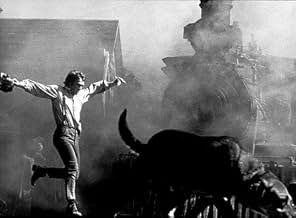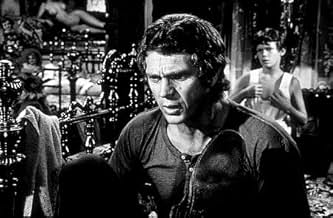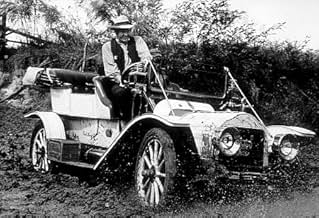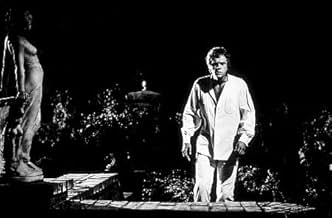IMDb-BEWERTUNG
6,6/10
3469
IHRE BEWERTUNG
Ein 11-jähriger Junge wird volljährig, als zwei schelmische erwachsene Freunde ihn überreden, das Familienauto für eine Reise nach Memphis und eine Reihe von Abenteuern auszuschlachten.Ein 11-jähriger Junge wird volljährig, als zwei schelmische erwachsene Freunde ihn überreden, das Familienauto für eine Reise nach Memphis und eine Reihe von Abenteuern auszuschlachten.Ein 11-jähriger Junge wird volljährig, als zwei schelmische erwachsene Freunde ihn überreden, das Familienauto für eine Reise nach Memphis und eine Reihe von Abenteuern auszuschlachten.
- Regie
- Drehbuch
- Hauptbesetzung
- Für 2 Oscars nominiert
- 5 Nominierungen insgesamt
Empfohlene Bewertungen
I have not read the Faulkner story on which this is based, so I can't comment on how much of this delightful film can be credited to him (doubtless Burgess Meredith's voiceovers are Faulkner's words), but this wonderful movie about the pain of growing up is laced with plenty of adventure and fun and deserves to become a classic. The John Williams score is superb. The acting is wonderful from all the leads, including the boy. This is one of the underrated Steve McQueen's best roles, and Will Geer is perfect in the small but rich part of Boss. The characters are all wonderfully and richly fleshed out, and there are many moments of human insight. To top it off, the cinematography makes the movie simply gorgeous to look at.
Considering the movie's manifold virtues it's interesting to note that one never sees it on any of the cable channels. The reason is obvious, and it's political correctness. The movie uses the "n" word multiple times, although always in the same way Mark Twain used it, i.e. to demonstrate the inhumanity behind the use of the word. Also Corrie has her eye blackened by Boone, and Ned explains to Lucius "what better sign can a woman want from a man that he has her on his mind." All this racism and sexual violence is of course abhorrent, but the forces of political correctness would rather pretend that it never existed than to look it square in the eye.
So to see this movie you'll have to buy it on DVD, which I strongly urge you to do.
Considering the movie's manifold virtues it's interesting to note that one never sees it on any of the cable channels. The reason is obvious, and it's political correctness. The movie uses the "n" word multiple times, although always in the same way Mark Twain used it, i.e. to demonstrate the inhumanity behind the use of the word. Also Corrie has her eye blackened by Boone, and Ned explains to Lucius "what better sign can a woman want from a man that he has her on his mind." All this racism and sexual violence is of course abhorrent, but the forces of political correctness would rather pretend that it never existed than to look it square in the eye.
So to see this movie you'll have to buy it on DVD, which I strongly urge you to do.
I personally rank this film, based on William Faulkner's last novel, among my favorites. Not that I would rank it as a "great" film, but it's a lot of fun. It's true that McQueen may have been in fact older than his character was supposed to be, but his attitude and style seems to bring it off. Mitch Vogel, as the young boy Lucius, who is lured into stealing his grandfather's (Will Geer) new Winton Flyer automobile for a wild weekend in Memphis by Boone Hoggenbeck (McQueen) is completely believable as a kid who wants the adventure, but has to be drawn into it because he respects his grandfather so much. Rupert Crosse as McQueen's other reiver (thief) in this caper adds an extra comic relief as the one who gets them into a real fix in Memphis. Ordinarily I hate movies with running narration, but the narration in this by Burgess Meredith as the grown old Lucius, remembering his exciting weekend in Memphis, adds a real touch of poignancy to this tale of youth lost. Additionally, Sharon Farrell as McQueen's prostitute girlfriend, Clifton James as a vicious southern sheriff, and Juano Hernandez as a kindly old black farmer add real dimension to the film. Throw in a beautiful score by John Williams (his first film score) and you've got the makings of a warm, charming story, accurately drawn, from the turn of the century. The scene at the film's end, where the grandfather has a heart-to-heart talk with the boy, is wonderful, and very "authentic." The director, Mark Rydell, did a terrific job. I've seen this movie many times, and it never fails to entertain me.
This was a great film written by the famous writer William Faulkner dealing with an old man going back to his youth sixty years ago. Steve McQueen, (Boon Hogganbeck) along with a few of his friends decided to take a trip from Mississippi to Memphis in an old time car which was relatively new during this period of time and taking along a very young boy named Lucius, (Mitch Vogel). Boon takes Lucius into a brothel where he stays over night in Memphis and learns a great deal about the birds and the bees and especially from a sweet kind lady named Carrie, (Sharon Farrell) who is a gal very much in love with Boon. There is a horse race and lots of laughs and drama to go along with the rest of the picture. There was a great deal of problems between the director of this film Mark Rydell and Steve McQueen, but the film was finally completed but the producer would never direct another picture with McQueen.
This movie holds a special significance to me as it was one of my late father's favorites. It's a William Faulkner coming-of-age story about a boy named Lucius (Mitch Vogel) in early 1900s Mississippi. Lucius looks up to Boon (Steve McQueen), the immature handyman on his grandfather's plantation. Boon convinces Lucius to help him "borrow" the grandfather's brand new car and drive to Memphis to see Boon's prostitute girlfriend (Sharon Farrell). Tagging along for the ride is Lucius' older cousin Ned (Rupert Crosse), who's almost as irresponsible as Boon. Once in Memphis, a lot of things happen and they wind up needing to win a horse race to get the grandfather's car back.
McQueen is good in a role a little outside of his wheelhouse. Vogel, Farrell, and Crosse are all good as well. Will Geer plays the grandpa. Light-hearted but with some serious moments. In many ways it plays like a Disney film of the period, except with whores and people using the N-word. William Faulkner is probably my favorite Southern author but his work hasn't been considered easy to translate to screen. This is one of the better efforts.
McQueen is good in a role a little outside of his wheelhouse. Vogel, Farrell, and Crosse are all good as well. Will Geer plays the grandpa. Light-hearted but with some serious moments. In many ways it plays like a Disney film of the period, except with whores and people using the N-word. William Faulkner is probably my favorite Southern author but his work hasn't been considered easy to translate to screen. This is one of the better efforts.
I saw this film when I was about the same age as the main character, the boy, played by Mitch Vogel. It left a strong impression on me. The cinematography, the magnificent score by John Williams, flawless acting, and, of course, Faulkner's story, create an atmosphere that few movies achieve. In terms of acting, McQueen is probably the weakest link, but he still deserves points for successfully suppressing his characteristic squint and open-mouthed grimace -- and he is as close to lovable as he can be. The movie also has more than it's share of memorable scenes, especially between Will Geer as the grandfather and Vogel.
I would be wary of letting young children see this film. The story conveys the undercurrents of racism and sexism that existed then (and now). I was 12 when I saw it and I understood it. As a parent, be ready to explain some things, though, and preview the film.
I would be wary of letting young children see this film. The story conveys the undercurrents of racism and sexism that existed then (and now). I was 12 when I saw it and I understood it. As a parent, be ready to explain some things, though, and preview the film.
Wusstest du schon
- WissenswertesThe Winton Motor Carriage Company was a real automobile manufacturer, but they never produced a "Winton Flyer" model. The vehicle in the film was created from scratch by Kenneth Howard, aka Von Dutch, especially for this movie. The car was designed to resemble a typical vehicle from 1904, but built to withstand the rigors of filming. Steve McQueen called the car "the real star of the picture", and took possession of it after filming ended. It remained in his automobile collection until his death in 1980. It can be seen in the Petersen Automotive Museum in Los Angeles, CA.
- PatzerWhen Boon, Ned and Lucius begin their trip to Memphis in the Winton, the beginning of the scene is filmed in a traveling shot. As the journey proceeds, the camera truck's engine note can be heard in addition to the Winton's.
- Zitate
Boon Hoggenbeck: Sometimes you have to say goodbye to the things you know and hello to the things you don't!
- Crazy Creditsand introducing Mitch Vogel as Lucius
- VerbindungenFeatured in Steve McQueen: Man on the Edge (1989)
Top-Auswahl
Melde dich zum Bewerten an und greife auf die Watchlist für personalisierte Empfehlungen zu.
- How long is The Reivers?Powered by Alexa
Details
Box Office
- Budget
- 5.000.000 $ (geschätzt)
- Laufzeit
- 1 Std. 47 Min.(107 min)
- Seitenverhältnis
- 2.35 : 1
Zu dieser Seite beitragen
Bearbeitung vorschlagen oder fehlenden Inhalt hinzufügen























